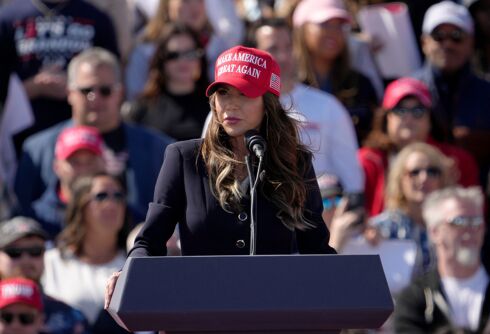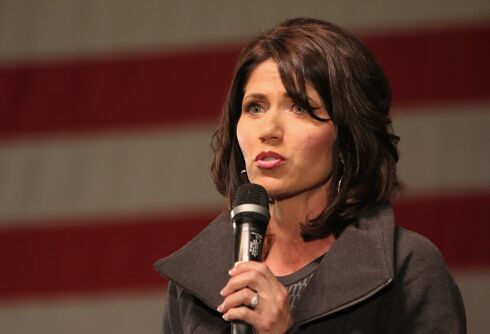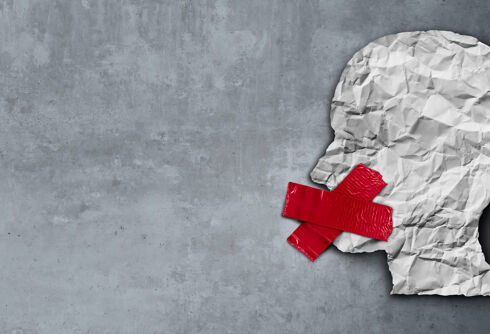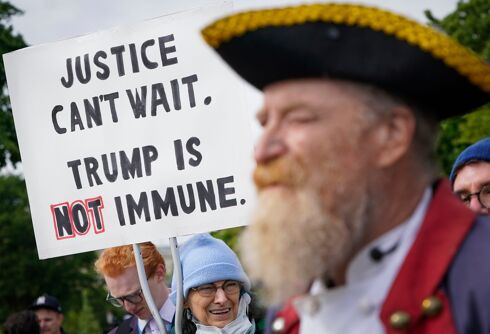If you sneezed last week, you might have missed them. Two major changes in the fight for LGBT equality took place — and they literally will change the playing field forever.
During the Republican presidential debate last Sunday on NBC’s “Meet the Press,” before the New Hampshire primary, a new benchmark in LGBT equality — at least for Republicans — was christened. And the surprise was who set it and who shrugged it off. The frontrunner, former Massachusetts Gov. Mitt Romney, did the honors.
Here’s the thumbnail version.

Never Miss a Beat
Subscribe to our newsletter to stay ahead of the latest LGBTQ+ political news and insights.
Romney, who, it seems during this nomination process has cast aside his previous limited LGBT equality record, states very clearly that he supports nondiscrimination and that, as governor, he appointed LGBT people to his administration and as judges. He then said clearly that he does not discriminate on the basis of sexual orientation.
So he answered the question and you’d think that was it, but the journalist — this guy was good — then asked: But what will you do to further the rights of LGBT people?” (Again, journalists please note the phrasing of the question.) Romney clearly says, “I just did that.” Applause. He adds that the only difference he has with the gay community is that he believes “marriage” is solely between a man and a woman. Applause from the audience again.
Here’s the surprise, and why this is a moment that will be marked as the beginning of the long road to reality for Republicans: They then went to Santorum with the question. He attempted to make a joke but it was obvious that the audience was not amused, so he sidestepped the question that has been a hallmark of his campaign. It was his chance to stand out and he knew that disparaging gays would no longer work. And so did every candidate standing up there, since no one took Romney on.
How serious of a change is this?
The Obama campaign was quick to send out a press release Monday morning suggesting that Romney was stepping away from comments made at the debate, but that was based on a 2002 flyer that Romney’s team had disavowed. Point is, the handwriting is on the wall and Republicans see the inevitable. Americans are tired of them trashing the gay community. So the frontrunner has drawn a new line in the sand: We believe in nondiscrimination up to the issue of marriage.
So enjoy the next few months and watch the dying gasps of the anti-equality Republican rhetoric, since this is the last presidential race you’ll hear it. They won’t go quietly, but Romney’s statements, if he’s nominated, make that change inevitable.
There was another change last week that needs noting, since my previous column really hit hard on that issue: Chicago’s Cardinal George comparing our community to the KKK. We congratulated the Chicago community on planning to demonstrate against the cardinal, and this column went further, suggesting that if no apology or meeting with the community happened, a look at the Church’s finances would be in order.
Guess what happened?
The church blinked, as it did in D.C. when challenged. George apologized. The community in Chicago is mixed on whether the apology was strong enough, but this is their turf, and it is imperative that the national community take note that the Church now twice has blinked when challenged.
This is a major change. While we should respect the Church and its religious views, it is also time for the Church to treat our community with that same respect. If not, we must use our tools to create a climate of respect.
Change is in the wind. It is imperative to recognize it and know how to move on to the next battle for equality. The two greatest foes of equality both shifted in one week —important benchmarks on our path to equality.














Two major benchmarks in LGBT history will change the playing field forever